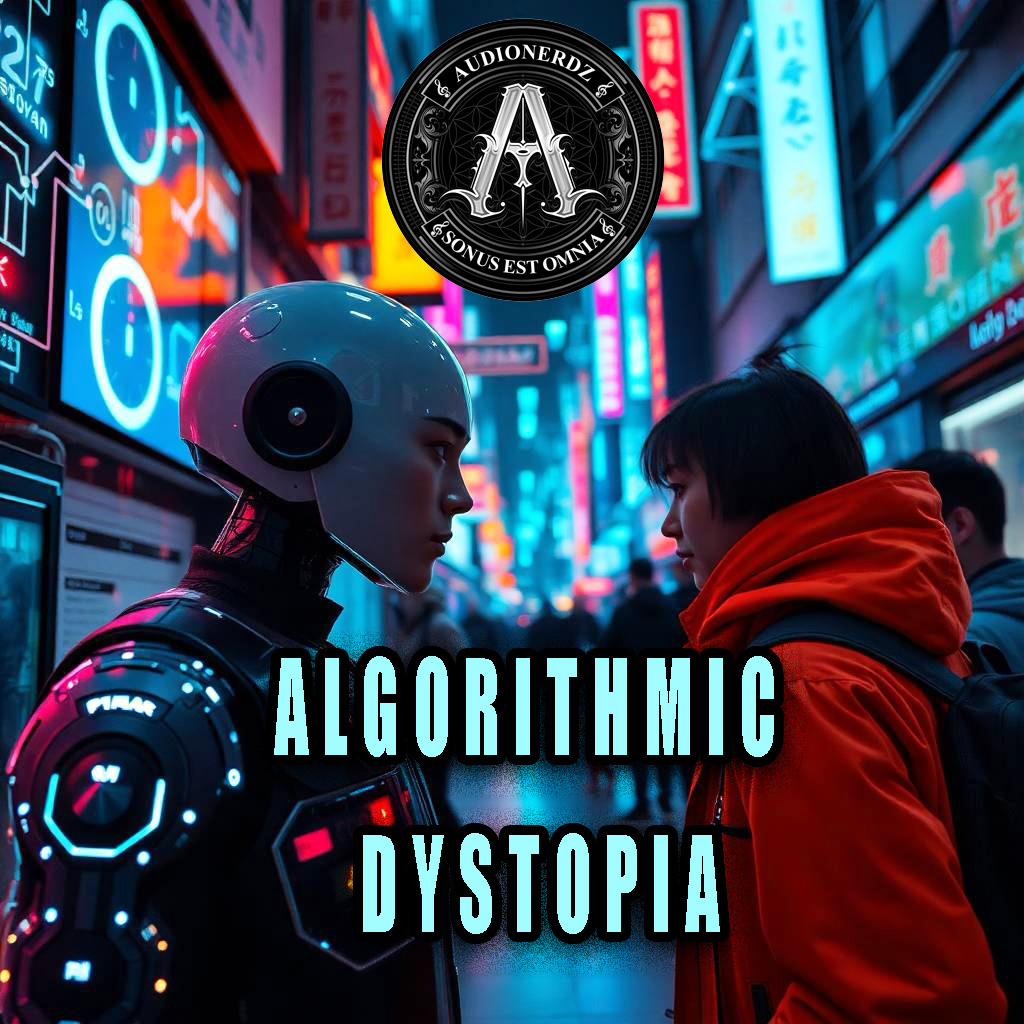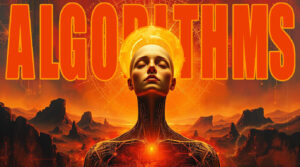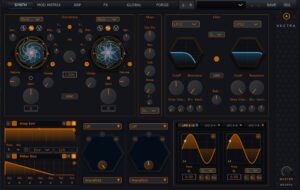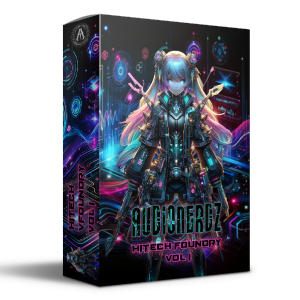
RISE OF THE ALGORITHMS
By 2025, algorithms control most aspects of life, influencing everything from social media feeds to music recommendations, to purchasing habits. The rise of machine learning and AI means that human behavior and choices are increasingly shaped by these digital systems.

Watch the Video Version:
You’re Not in Control: How Algorithms Secretly Run Your Life
Introduction: The Algorithmic Takeover
Every single day, you make choices—or at least, you think you do. But what if I told you that most of your decisions aren’t really yours? That the music you listen to, the news you consume, the people you connect with, and even the way you think are all shaped by AI-driven algorithms? Welcome to 2025, where artificial intelligence isn’t just influencing our lives—it’s running them.
As an artist deeply interested in transhumanism, I’ve watched this transformation unfold over the years. The digital landscape isn’t just changing; it’s morphing into something entirely new. A world where algorithms dictate what we see, hear, feel, and create. This isn’t speculation; this is reality.
Let’s break it down.
1. The Illusion of Free Will: How AI Dictates Your Choices
You wake up, grab your phone, and scroll through your feed. The first thing you see isn’t random—it’s curated. Every post, video, and recommendation is the result of an advanced AI model trained to keep you engaged for as long as possible.
Social media feeds (Facebook, Instagram, TikTok, Twitter/X) prioritize content that triggers emotional reactions.
Streaming platforms (Spotify, YouTube, Netflix) push content based on previous engagement, not necessarily what you might want but what you’re likely to keep watching.
E-commerce sites (Amazon, eBay) strategically place products in front of you, subtly guiding your purchasing decisions.
Everything is optimized for one thing: your attention. And once they have it, they can predict your behavior, influence your decisions, and subtly nudge you towards certain actions—without you even realizing it.
2. The Music Industry: Artists vs. Algorithms
As a musician, I see firsthand how algorithms shape the music industry. The days of pure artistic discovery are over. Now, streaming services like Spotify and Apple Music use machine learning to decide which artists rise and fall.
The algorithm rewards consistency (frequent uploads, predictable engagement). Creativity takes a backseat to algorithmic optimization.
Viral moments matter more than long-term artistic depth. Artists now make music for the algorithm, not for human connection.
AI-generated music is on the rise. Some platforms already use AI to compose music tailored to specific moods and listeners, competing with human musicians.
If you’re a creator, you’re not just competing against other artists anymore—you’re competing against the algorithm itself.
3. The Social Media Trap: Addictive by Design
Social media is the ultimate algorithmic beast. Every like, share, and comment is tracked, analyzed, and used to keep you scrolling. These platforms aren’t just apps; they’re behavioral conditioning tools designed to exploit human psychology.
Infinite scroll? It keeps you hooked, never giving your brain a chance to stop.
Dopamine-driven notifications? They create micro-rewards that keep you coming back.
Algorithmic biases? They reinforce existing beliefs, creating echo chambers that distort reality.
The result? People spend hours in digital loops, addicted to the illusion of choice while algorithms dictate what they see, think, and believe.
4. Transhumanism: The Next Evolution or the Ultimate Control Mechanism?
I’ve always been fascinated by transhumanism—the idea that technology can enhance human potential. But in 2025, who controls the technology?
Wearable AI: Smartwatches and implants now track biometrics in real-time, offering health insights but also feeding huge datasets to corporations.
Brain-computer interfaces (BCIs): Companies like Neuralink are working on direct AI-brain integration, promising mind-blowing potential but also raising serious privacy concerns.
AI-assisted creativity: AI can now write, compose, paint, and even produce films, challenging traditional human creativity.
Transhumanism was supposed to empower us. But in a world controlled by algorithms, is it really enhancement—or just deeper submission to AI systems?
5. Breaking Free: Can You Outsmart the Algorithm?
So, what can you do to take back control?
🔹 Be intentional: Instead of mindless scrolling, actively seek out content you want to consume. 🔹 Diversify your sources: Use independent platforms, forums, and offline sources to broaden your perspective. 🔹 Turn off algorithmic recommendations: Some platforms allow you to disable AI-curated feeds (if only temporarily). 🔹 Create on your terms: If you’re an artist or content creator, try to balance algorithmic appeal with true creative expression. 🔹 Embrace conscious technology: Use AI as a tool, not a dictator. Make sure tech is serving you, not the other way around.
Conclusion: The Future Is Algorithmic—But It’s Not Set in Stone
The truth is, algorithms aren’t evil. They’re just powerful. They can be tools for control or tools for liberation. The difference lies in how we interact with them.
In 2025, we stand at a crossroads: Do we let AI dictate our lives, or do we find ways to coexist while maintaining autonomy?
The choice is yours.
But remember—you’re not as in control as you think.
TRANSCRIPT:
As an artist, a producer, and someone deeply connected to the world of technology and psychedelia, I’ve always been fascinated by how rapidly our world is evolving. The digital revolution has been a constant theme in my life and my music, from the tools I use in music production to the ever-advancing landscape of artificial intelligence (AI), automation, and algorithms. In 2025, it’s undeniable: algorithms control almost every part of our lives.
I’m not surprised by these developments, though. If you’d asked me years ago, I would’ve said we were already heading this way—into a world where human choices are increasingly shaped by machine learning, data-driven algorithms, and AI-powered systems. It’s the next logical step in the ongoing dance between humanity and the machines we’ve built, a concept deeply embedded in transhumanism.
Algorithms and the Digital Landscape
In 2025, algorithms are no longer something we merely interact with; they have become the undercurrent of modern existence. From social media feeds curating our emotional responses to the music we listen to, every experience is being influenced by algorithms in ways we may not even notice. My music, for instance, is impacted by recommendation engines—Spotify, YouTube, Apple Music—shaping what tracks get exposure based on complex data models. Whether it’s through algorithmic playlists or curated experiences, every click and stream is being tracked and analyzed, turning us into data points for further optimization.
On the surface, this feels almost too futuristic, like something ripped out of a dystopian novel. But, as an artist who’s seen firsthand the power of digital spaces, I understand how algorithms work to bring opportunities. They can push my music to new listeners in distant corners of the world, allowing for an international reach that would’ve been impossible a decade ago. Yet, at the same time, they also create a system where creativity is often measured by its algorithmic appeal—whether it fits into a predetermined mold of what’s popular or trending.
The Algorithmic Influence on Culture and Identity
As much as I embrace these advancements, I also recognize the consequences of living in an algorithm-driven world. Algorithms shape not just our entertainment choices but our identities. The way we interact with technology is becoming less about human agency and more about AI learning our behaviors, desires, and fears. A postmodern condition, perhaps, where we are all both creators and creations, as we blend into a world of simulated preferences.
Social media platforms are the most obvious examples of this phenomenon. By 2025, algorithms control how we engage with our world. They determine which news we see, the friends we interact with, and even the products we buy. They build our digital identities, sometimes more precisely than we can ourselves. On platforms like Instagram and TikTok, the content we post is often created with an algorithmic framework in mind. The fear of being overlooked, of not reaching enough people, has turned many creators into self-replicating systems that cater to the whims of engagement metrics. What happens when creativity is no longer purely driven by inspiration, but by the algorithmic possibility of virality?
This dynamic also impacts music. As an artist, I’ve seen how platforms’ algorithms have transformed not just how we consume music but also how we make it. Everything from production techniques to distribution methods has been influenced by these algorithmic systems. The push toward more engaging hooks, the emphasis on shorter track lengths, and the focus on catchy, easily digestible melodies all reflect the needs of algorithms that prioritize listener retention.
The Rise of Transhumanism
If there’s one thing that’s been on my radar, it’s the growing convergence between human life and AI. As someone who follows transhumanism closely, I’ve often wondered where the line between humanity and technology will blur—and it’s happening faster than I could’ve ever imagined. Algorithms don’t just influence our habits anymore; they’re becoming integrated into the very essence of who we are.
Take wearable technology, for example. Smartwatches and fitness trackers are nothing new, but in 2025, they’ve evolved into even more immersive tools. AI-powered health monitoring algorithms now manage our daily routines, predicting and influencing everything from what we eat to how we sleep. These technologies are paving the way for a future where humans and machines are intertwined, guided by an ever-present digital network of interconnected data points.
As an artist, I often reflect on the potential for these algorithms to not only enhance human performance but to change what it means to be human. With the rise of AI-powered music production tools, I find myself imagining a future where music is created in collaboration with AI, where algorithms not only shape the sound but influence the emotions that music evokes. The symbiosis between human creativity and AI could open up an entirely new frontier for artistic expression.
The Ethics of Living in an Algorithmic World
Of course, with all these advancements come questions about ethics, autonomy, and the very nature of free will. In a world where algorithms dictate so much of our experience, from the ads we see to the way we interact with each other, it’s easy to ask: Do we truly have control over our lives?
For a long time, we’ve been told that technology is a tool—something we control. But in 2025, it’s clear that the tools are shaping us just as much as we shape them. From manipulating our choices to influencing our emotions, algorithms have become a powerful force in shaping society’s narrative.
This doesn’t have to be a negative thing, though. As a transhumanist, I see the potential for technology to enhance humanity. What if, instead of merely reacting to algorithms, we learned to co-create with them? What if, instead of fighting against the digital system, we could use it to amplify our potential as creators, thinkers, and innovators?
Embracing the Algorithmic Future
We’re not just consumers of technology anymore; we’re deeply integrated into it. In 2025, algorithms have become the invisible hand guiding our daily lives, but this doesn’t have to be something to fear. As an artist deeply invested in the transhumanist vision, I see the potential for these technologies to elevate humanity to new heights of creativity, connection, and consciousness.
We’re living in an age where algorithms not only predict our actions—they shape our future. It’s up to us to decide how we use these powerful tools, and whether we’ll allow them to enhance or diminish our collective human experience. The key, I believe, lies in embracing these changes, coexisting with our creations, and navigating the fine line between control and freedom. The future is here—and it’s algorithmically enhanced.
- Sale!

VECTRA – The Living Synthesizer (Early Access)
Original price was: 199,00 €.89,00 €Current price is: 89,00 €. - Sale!

Alpha Sirius Hitech Trance Template – 175 Bpm Am
Original price was: 19,99 €.9,99 €Current price is: 9,99 €. -

Audionerdz Hitech Foundry Volume One – Sully FX Uplifter
0,50 € - Sale!

Paranndroid`s Ultimate Acid Critters Sample Pack (1 Hour of Samples)
Original price was: 49,99 €.24,99 €Current price is: 24,99 €.



